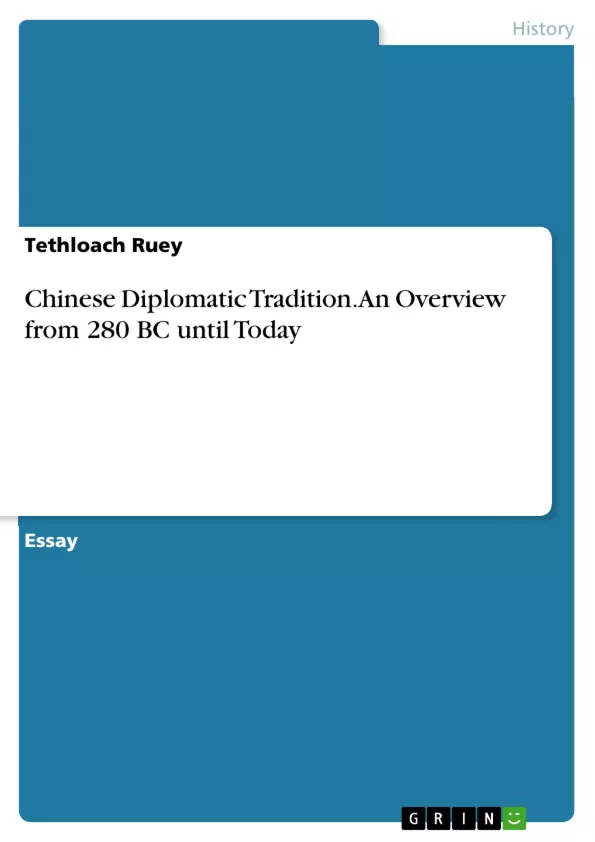This paper discusses the characteristics of the Chinese diplomatic tradition and individuals and events that have influenced and shaped Chinese diplomacy. This article aims to inform practitioners and students of diplomacy, and those interested in transnational diplomacy about the characteristics of Chinese diplomacy. It follows Chinese history from 480 BC on to the Post-Mao era. A quiz is included at the end of the paper.
The paper argues that in medieval times, the Chinese regarded themselves as the geographic center of civilization and considered non-Chinese as 'barbarians' who could not have any ties with China. Trade with other nations was considered to be an act of charity since China viewed itself as self-sufficient in its resources. This attitude changed during the First Opium War, and China became a major player in international relations.
Frequently asked questions
What is "The Chinese Diplomatic Tradition" about?
This paper discusses the characteristics of the Chinese diplomatic tradition and individuals and events that have influenced and shaped Chinese diplomacy. It aims to inform practitioners and students of diplomacy, and those interested in transnational diplomacy about the characteristics of Chinese diplomacy.
What is the old diplomatic thought in China?
In medieval times, the Chinese regarded themselves as the geographic center of civilization and considered non-Chinese as `barbarians'. If the `barbarians' desired to have relations with China, their leaders would have to kowtow before Chinese emperors. China considered trade with other nations an act of charity because China was self-sufficient. This attitude changed during the First Opium War.
What were the key features of diplomacy before China became a unified empire?
Before China became a unified empire, the diplomacy was characterized by rivalry for power. Diplomacy and espionage coexisted due to frequent conflicts among independent Chinese states. The Chou Court ceremonials represented the formal style of diplomacy and diplomacy was conducted through the exchange of envoys.
How did the unified Chinese empire view diplomacy?
The Chinese held the view that China was the `Celestial Dynasty' or the `geographic center' of world civilization, with its emperor being the leader of the civilized world. They perceived themselves as the only educated people, and the `barbarians' had to respect them. This isolationist view meant that other countries were regarded as tributaries of China under its suzerain rule.
What impact did foreign wars have on Chinese diplomacy?
The 1839 Anglo-Chinese War was a turning point. Under Dr. Sun Yat-sen, the Chinese realized they had to become proficient in diplomatic norms and forge closer ties with friendly countries. Broadly speaking, the Opium Wars, the ChinaJapan War, the Boxer Revolution, the Treaty of Versailles, and the Second ChinaJapan War impacted China's foreign relations.
What was the diplomatic shift in the post-Mao era?
In the post-Mao era, Chinese leaders began to forge active ties with other countries and comprehend the need to exercise diplomacy. Deng Xiaoping tried to make China more pragmatic, moving away from cultural superiority to a more moderate position. Chinese leaders began to visit foreign countries, and the foreign ministry became the most important department.
What are some modern characteristics of Chinese diplomacy?
China no longer perceives itself as the center of civilization, but recognizes a globalized world where countries are interdependent. China has established links with a variety of countries, is active on the diplomatic circuit, and is operating within the framework of the international community. However, China still views negotiation as a form of war, and Chinese diplomats are well-trained, including in the art of deception.
How has China’s relationship with other countries changed?
China has shifted from viewing itself as the superior civilization to recognizing the importance of establishing links with other nations and engaging in international diplomacy. Today, China has established links with many countries and actively participates in the global community.
- Quote paper
- Tethloach Ruey (Author), 2017, Chinese Diplomatic Tradition. An Overview from 280 BC until Today, Munich, GRIN Verlag, https://www.grin.com/document/375813



